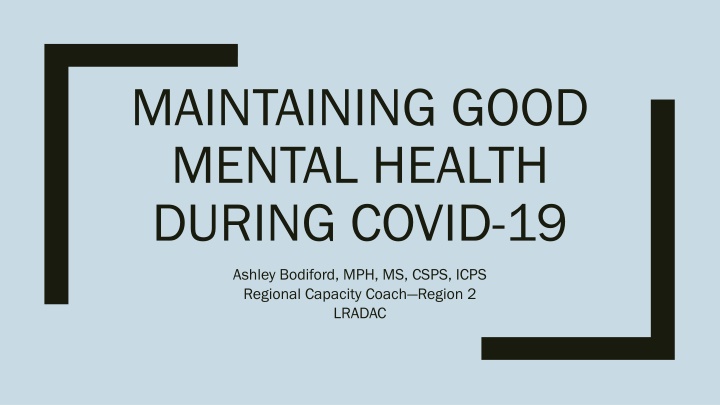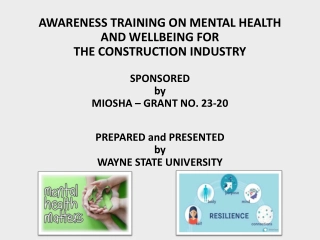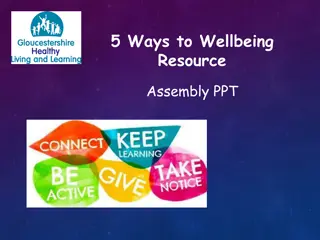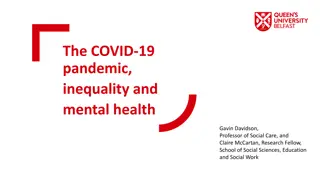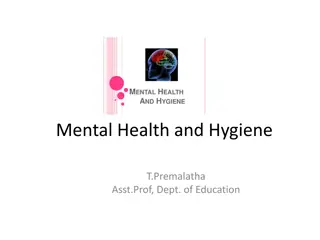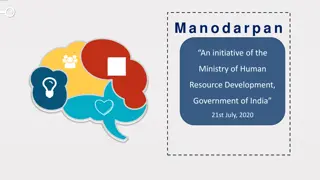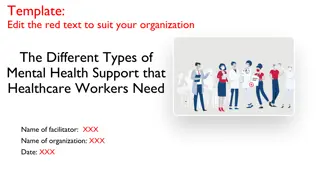Maintaining Good Mental Health During COVID-19
The COVID-19 pandemic has brought significant changes and challenges to daily life, leading to stress, anxiety, fear, and loneliness. To maintain good mental health during this time, it's crucial to understand the life changes, practice self-care strategies, and take care of both your physical and mental well-being.
Download Presentation

Please find below an Image/Link to download the presentation.
The content on the website is provided AS IS for your information and personal use only. It may not be sold, licensed, or shared on other websites without obtaining consent from the author.If you encounter any issues during the download, it is possible that the publisher has removed the file from their server.
You are allowed to download the files provided on this website for personal or commercial use, subject to the condition that they are used lawfully. All files are the property of their respective owners.
The content on the website is provided AS IS for your information and personal use only. It may not be sold, licensed, or shared on other websites without obtaining consent from the author.
E N D
Presentation Transcript
MAINTAINING GOOD MENTAL HEALTH DURING COVID-19 Ashley Bodiford, MPH, MS, CSPS, ICPS Regional Capacity Coach Region 2 LRADAC
Understanding Life Changes The COVID-19 pandemic has likely brought many changes to how you live your life, and with it uncertainty, altered daily routines, financial pressures, and social isolation. You may worry about getting sick, how long the pandemic will last, and what the future will bring. Information overload, rumors, and misinformation can make it unclear what to do. During the COVID-19 pandemic, you may experience stress, anxiety, fear, sadness and loneliness.
Maintaining Self-Care Self-care strategies are good for your overall mental and physical health. When done regularly, they can help you to remain balanced. It is important to take care of your body and mind, as well as connecting with others to benefit your mental health. Connection doesn t only have to happen in-person. In-person connection has been limited, because of social distancing regulations. However, there are still ways to emotionally connect with others during this time.
Take Care of Your Body Get enough sleep. Go to bed and get up at the same times each day. Stick close to your typical schedule, even if you're staying at home. Participate in regular physical activity. Regular physical activity and exercise can help reduce anxiety and improve mood. Get outside in an area that makes it easy to maintain distance from people, as recommended by the U.S. Centers for Disease Control and Prevention (CDC) and the World Health Organization (WHO) or your government, such as a nature trail or your own backyard. Eat healthy. Choose a well-balanced diet. Avoid junk food and refined sugar. Limit caffeine as it can aggravate stress and anxiety. Limit screen time. Turn off electronic devices for some time each day, including 30 minutes before bedtime. Make a conscious effort to spend less time in front of a screen television, tablet, computer, and phone. Relax and recharge. Set aside time for yourself. Even a few minutes of quiet time can be refreshing and help to quiet your mind and reduce anxiety. Many people benefit from practices such as deep breathing, tai chi, yoga, or meditation. Soak in a bubble bath, listen to music, or read or listen to a book whatever helps you relax. Select a technique that works for you and practice it regularly.
Take Care of Your Mind Keep your regular routine. Maintaining a regular schedule is important to your mental health. In addition to sticking to a regular bedtime routine, keep consistent times for meals, getting dressed, work or study schedules, and exercise. Also set aside time for activities you enjoy. This predictability can make you feel more in control. Limit exposure to news media. Constant news about COVID-19 from all types of media can heighten fears about the disease. Limit social media that may expose you to rumors and false information. Also limit reading, hearing or watching other news, but keep up to date on national and local recommendations. Look for reliable sources such as the CDC and WHO. Stay busy. Enjoy hobbies that you can do at home. Doing something positive to manage anxiety is a healthy coping strategy. Focus on positive thoughts. Consider starting each day by listing things you are thankful for. Maintain a sense of hope. Use your moral compass or spiritual life for support. If you draw strength from a belief system, it can bring you comfort during difficult times. Set priorities. Don't become overwhelmed by creating a life-changing list of things to achieve while you're home. Set reasonable goals each day and outline steps you can take to reach those goals. Give yourself credit for every step in the right direction, no matter how small. And recognize that some days will be better than others.
CONNECTION TO OTHERS
Build Support & Strengthen Relationships Make connections. If you need to stay at home and distance yourself from others, avoid social isolation. Find time each day to make virtual connections by email, texts, phone calls, or FaceTime or similar apps. If you're working remotely from home, ask your co- workers how they're doing and share coping tips. Enjoy virtual socializing and talking to those in your home. Do something for others. Find purpose in helping the people around you. For example, email, text, or call to check on your friends, family members, and neighbors. If you know someone who can't get out, ask if there's something needed, such as groceries or a prescription picked up, for instance. But be sure to follow CDC, WHO, and your government recommendations on social distancing and group meetings. Support a family member or friend. If a family member or friend needs to be isolated for safety reasons, or gets sick and needs to be quarantined at home or in the hospital, come up with ways to stay in contact. This could be through electronic devices or the telephone or by sending a note to brighten the day, for example.
Difficult Situations Stress is a normal psychological and physical reaction to the demands of life. Everyone reacts differently to difficult situations, and it's normal to feel stress and worry during a crisis. But multiple challenges daily, such as the effects of the COVID-19 pandemic, can push you beyond your ability to cope. Despite your best efforts, you may find yourself feeling helpless, sad, angry, irritable, hopeless, anxious, or afraid. You may have trouble concentrating on everyday tasks, experience changes in appetite, body aches and pains, or difficulty sleeping. When these signs and symptoms last for several days in a row, and cause problems in your daily life, it's time to ask for help.
Seeking Help If you have concerns or if you experience worsening of these symptoms, ask for help when you need it, and be upfront about how you're feeling. To get help you may want to: Contact a close friend or loved one even though it may be hard to talk about your feelings. Contact a minister, spiritual leader, or someone in your faith community. Contact your employee assistance program, if your employer has one, or ask for a referral to a mental health professional. Call your primary care provider or mental health professional to ask about appointment options, or to get advice and guidance. Some may provide the option of phone, video, or online appointments. Contact organizations such as the SC Department of Mental Health (SCDMH), LRADAC, National Alliance on Mental Illness (NAMI) or the Substance Abuse and Mental Health Services Administration (SAMHSA) for help and guidance.
Future Steps You can expect your current strong feelings to fade, but stress won't disappear from your life when the health crisis of COVID-19 ends. Continue these self-care practices to take care of your mental health and increase your ability to cope with life's ongoing challenges.
References Covid-19 and your mental health. Mayo Clinic. https://www.mayoclinic.org/diseases-conditions/coronavirus/in-depth/mental-health-covid-19/art- 20482731. Accessed May 14, 2020. How stress affects your health. American Psychological Association. https://www.apa.org/helpcenter/stress-facts. Accessed March 20, 2020. Taking care of your emotional health. Centers for Disease Control and Prevention. https://emergency.cdc.gov/coping/selfcare.asp. Accessed March 20, 2020. COVID-19 (coronavirus) information and resources. National Alliance on Mental Illness. https://www.nami.org/About-NAMI/NAMI-News/2020/NAMI- Updates-on-the-Coronavirus. Accessed March 20, 2020. Mental health and coping during COVID-19. Centers for Disease Control and Prevention. https://www.cdc.gov/coronavirus/2019- ncov/about/coping.html. Accessed March 13, 2020. Mental health and psychosocial considerations during COVID-19 outbreak. World Health Organization. https://www.who.int/docs/default- source/coronaviruse/mental-health-considerations.pdf?sfvrsn=6d3578af_8. Accessed March 13, 2020. Your healthiest self: Emotional wellness toolkit. National Institutes of Health. https://www.nih.gov/health-information/emotional-wellness-toolkit. Accessed March 20, 2020. Violence prevention: Coping with stress. Centers for Disease Control and Prevention. https://www.who.int/news-room/fact-sheets/detail/mental- health-strengthening-our-response. Accessed March 20, 2020. Manage stress. U.S. Department of Health and Human Services. https://health.gov/myhealthfinder/topics/health-conditions/heart-health/manage- stress. Accessed March 20, 2020. Health effects of cigarette smoking. Centers for Disease Control and Prevention. https://www.cdc.gov/tobacco/data_statistics/fact_sheets/health_effects/effects_cig_smoking/index.htm#respiratory. Accessed March 25, 2020. Sawchuk CN (expert opinion). Mayo Clinic. March 27, 2020.
Ashley Bodiford, MPH, MS, CSPS, ICPS Ashley Bodiford, MPH, MS, CSPS, ICPS Regional Capacity Coach Region 2 LRADAC 803.201.9092 abodiford@lradac.org
